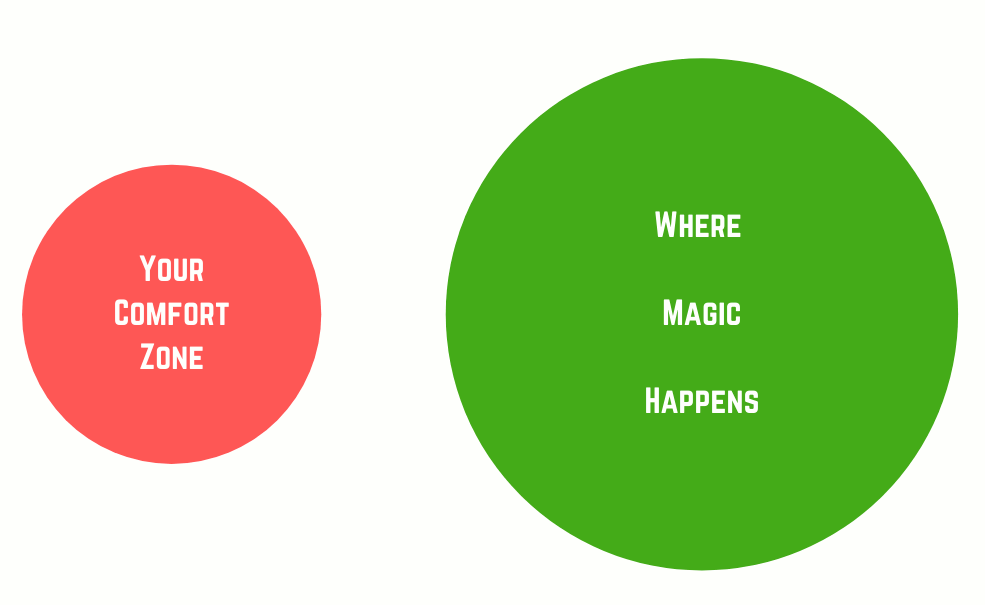
“Damn, I hate my job”, said David as he slammed his laptop shut. “I need to find another job which makes me happy to come to work”, he told himself as he placed his laptop into his bag and walked away from his desk with drooping shoulders.
6 months later, David is still working on the same job, hating it exactly as he did before.
Why does David put up with his job in spite of the stress? The answer is, most people prefer staying in their comfort zone.
Why do people stay in their comfort zone?
Comfort zone is a place where one feels safe and at ease. It is a place where you get acceptable results without any major discomfort.
People remain stuck in this zone for 3 primary reasons:
1. Laziness:
Human beings like to expend as little energy as possible. Stepping out of the comfort zone requires more effort in some shape or form.
For David to find another job, he needs to update his resume, upload it on job portals, talk to recruiters, look for references, prepare and appear for interviews and more. All in all, this sums up to quite a lot of effort.
Procrastinating the problem for a little longer seems like an easier choice right now instead of taking the pain of extra effort.
2. Uncertainty
Outside the comfort zone lies some element of risk. The new environment or change can bring in fear of uncertainty in your mind. In comparison, your current situation seems manageable.
David starts sweating when he wonders about his ability to fit into a new job, “What if I am unable to deliver?” “What if I am fired for poor performance?”
The possible negative consequences of a change can trap you into not making a change at all.
3. The point of emotional threshold
You and I have a threshold until which we tolerate a problem. This threshold is specific to each person and the type of discomfort.
David hates that his boss does not appreciate his effort but he can bear that. However, if he was humiliated in front of the whole team, he would type in his resignation letter immediately. His emotional threshold of quitting his job lies between lack of appreciation and public humiliation.
Until the difficulty stays below the threshold, you will put up with it and stay in your comfort zone.
7 proven tips to get out of your comfort zone
Here are 7 proven tips to step out of your comfort zone and reach your true potential.
1. Make the first step easy
“A journey of a thousand miles begins with a single step” – Chinese proverb
The most challenging part of making a change is taking the first baby step. If you manage to complete the first action, you have already won half the battle.
If you intend to start working out in the morning, make the first step as easy as possible. To start working out the first action is getting ready. Sometimes, that can be a reason in itself to avoid working out.
To avoid such excuses, pack all your gym clothing and accessories the previous night. As soon as the alarm sounds, you just have to slip them on and head out.
2. Implement changes incrementally
If you are a person who never works out, do not aim to run for 5 km as your new year’s resolution. You will only give up a few days later.
Your body has a tough time adapting to the change curve, so you must make it as simple as possible for yourself.
Instead of targeting a 5km run out of thin air, aim to run 15 minutes every alternate day.
Once you hit that goal for two weeks, increase the frequency to 4 days and the duration to 20 minutes. Notch it up little by little as time goes by and your body feels comfortable.
When you keep the change small, you have a higher chance of keeping up because your body and mind does not feel a drastic difference.
3. Use the 5-second rule
Mel Robbins has written a book on the 5-second rule. The rule is simple where you use a 5-second countdown to overcome laziness.
Do you feel like hitting the snooze button? Start counting 5-4-3-2-1 and sit up on the bed. Do you feel like grabbing a chocolate-coated donuts from the plate, count 5-4-3-2-1 and move away.
As simple as it sounds, it works like a charm to stop bad habits and start good ones.
4. Imagine your results
When you have to perform a difficult task you are not used to, your brain will lack the motivation to put in the effort.
If you plan to start your venture, the thought of the effort involved can stop you from taking any action.
A simple way to motivate yourself is to imagine the results as if you have already achieved them.
In the case of a venture, you can imagine your fame where people invite you to interviews. You can visualize visiting exotic places on a holiday from the money you’ve made. You can picture your ideal day where you do not have to answer to a boss.
5. Use time blocking technique
If you have trouble spending time on a specific task, set aside a specific time each day for that activity. Besides, when you begin, start small as mentioned before. That’s the basis of the time blocking technique.
For example, if you want to cultivate a habit of reading books, start with setting 10 minutes before bed for reading. Once you read for a week, increase the duration to 15 minutes. After a while, add a 15-minute slot in the morning too. Gradually increase the time blocks based on the activity you are targeting.
Do not underestimate the power of one small 10-minute block. It seems too minuscule when you begin, but a year later, you would have progressed to an extent you cannot fathom.
6. Use the cookie jar method
David Goggins ran a 100-mile ultra marathon using the cookie jar method. It involves making a mental note of all your achievements, big and small, called cookies and placing them in an imaginary jar.
When you find yourself on the verge of giving up, you must pick up a cookie and gobble it up for energy. In other words, you recall one achievement and tell yourself, “If I have accomplished such a feat before, I can do this.”
Sometimes all you need is a voice to tell you to push a little more. You can be that voice yourself.
7. Have an accountability partner
Partner up with a person with whom you must discuss your upcoming plans. Maybe you plan to start writing a book, lose weight, quit smoking or start your business in 6 months. Write down your tasks to accomplish, share it with your partner and discuss progress every week or two.
You might feel that you might ignore your goals in-spite of telling your partner. The truth is, telling anyone, even your best friend, that you failed at achieving your targets is uncomfortable to your ego. You will make an effort to complete whatever you had committed to.
Ensure that your accountability partner is either more or equally as serious as you are. If you partner with a reckless friend, it can produce a reverse effect where he poisons your mind into taking your goals lightly.
Conclusion
Getting out of your comfort zone is not easy. At the same time, it is not as difficult as it seems. All it takes is a toggle of a switch to get started. Once you begin, the rest seems like a smooth ride.
The question isn’t how to toggle that switch. You know where the switch is and you know how to toggle it. The question is – will you?
 I am Maxim Dsouza. I turned down a corporate job in a quest to build something successful of my own. In this journey, I have been a part of and contributed extensively to multiple failed startups. I am yet to find what works, but my experience has taught me what doesn’t.
I am Maxim Dsouza. I turned down a corporate job in a quest to build something successful of my own. In this journey, I have been a part of and contributed extensively to multiple failed startups. I am yet to find what works, but my experience has taught me what doesn’t.
Today, I write on my blog Productive Club. I share tips on how to improve productivity, overcome procrastination, improve focus and overcome fear based on my lessons learned. My approach is to never run a sprint but take small baby steps like a marathon while enjoying the journey.






